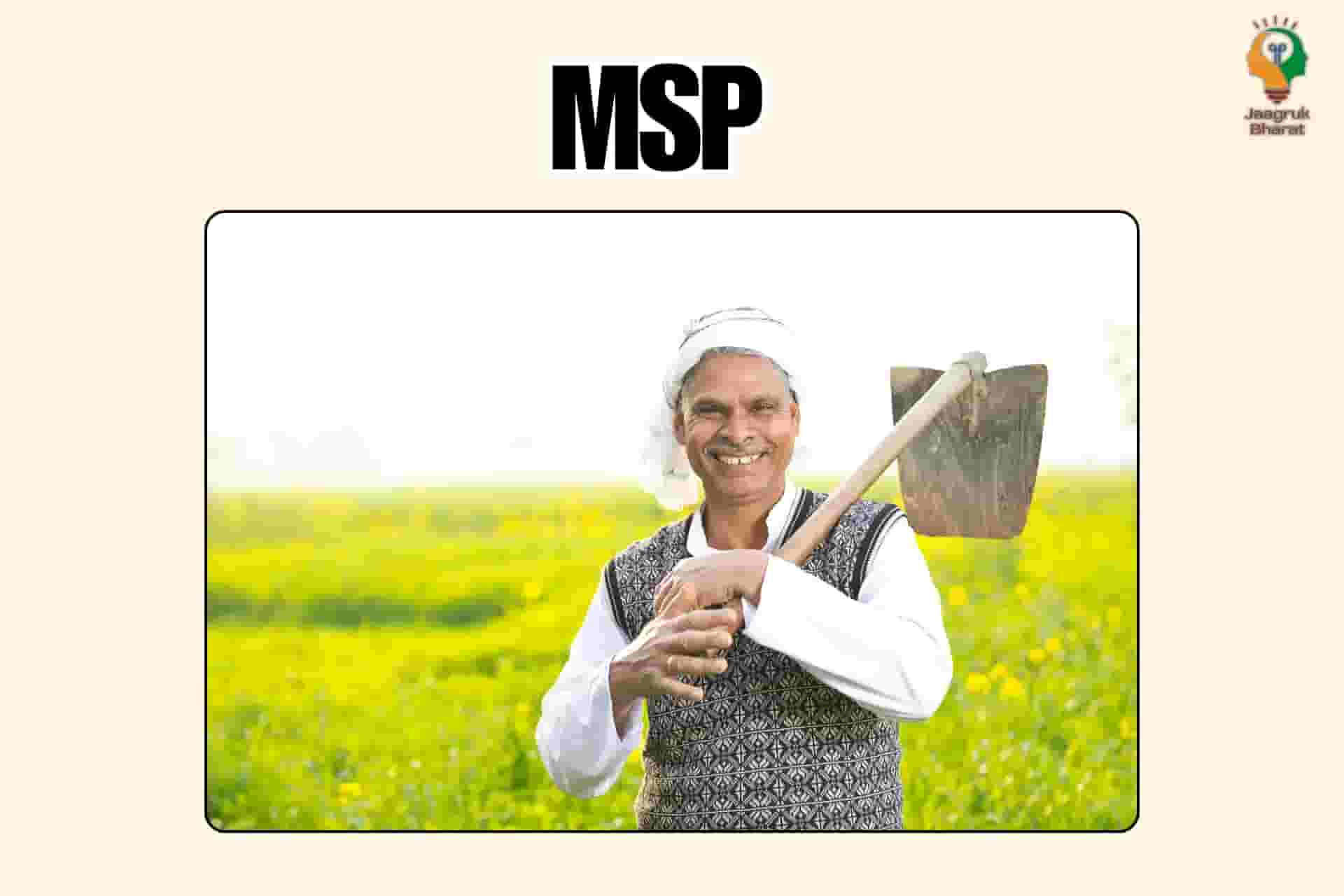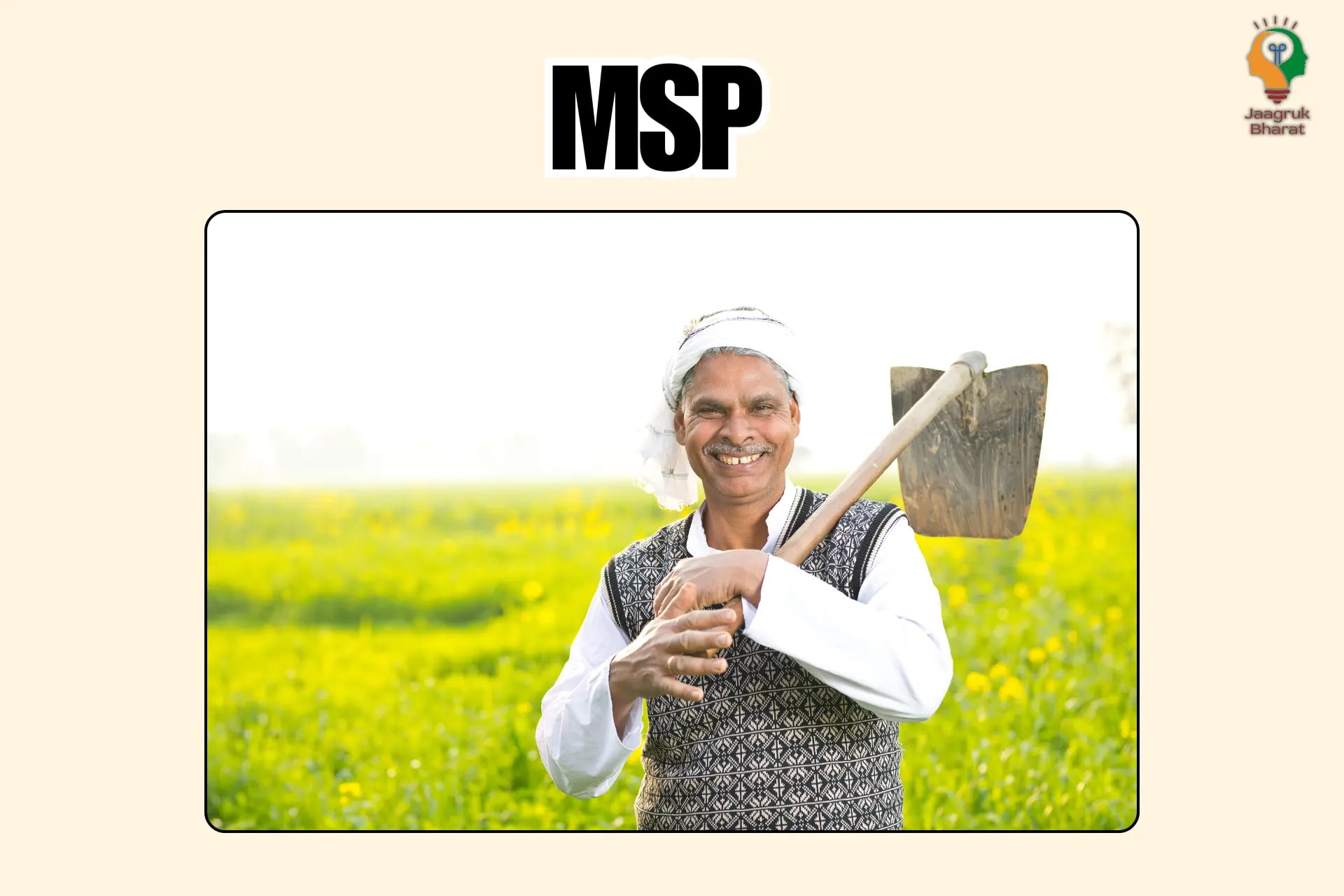Decoding Farmer Welfare: MSP Reforms, And Way Forward
Updated: 12-10-2025 at 11:36 PM
1k


Minimum Support Price comes as a boon for the farmers in such a position by granting them the benefits of both social and economic security. However, it is not a bed of roses and requires reforms to be entirely beneficial.
What Are MSP Reforms?
Minimum Support Price (MSP) refers to the rate at which the government buys crops from the farmers. The MSP is calculated by taking into account the cost of production incurred by the farmers and is at least 1.5 times higher than the cost incurred.
The MSP is decided twice every year for both Kharif and Rabi crops. The government buys all the crops of the farmers when the market price of such crops falls below the minimum support price. It is declared at the beginning of the sowing season by the government.
Different factors and reasons lead to the calculation of the Minimum Support Price every season. Furthermore, governmental actions, policy decisions, and economic decisions impact the cost of production incurred by the farmers.
Minimum Support Price reforms or MSP reforms are changes sought from and brought in by the government of India about the declaration of the price at which the government buys crops from the farmers. Reforms are necessary to accommodate the dynamic environment and address the raised concerns.
Read More: Weather-Based Crop Insurance Scheme- A Sigh of Relief For Farmers
History
The Minimum Support Price (MSP) system in India was established in 1966-67 during the Green Revolution. It was introduced to ensure that farmers don’t fall into the trap of exploitation and reap the benefits of fair practices. MSPs are simply fixed prices set for a particular crop at which farmers sell their produce to the government. The government then releases the food grains through the Public Distribution System.
Initially, MSPs were announced for only a certain number of crops but with time, many more crops were added as well.
Reasons For The Need for MSP Reforms
These reasons have not only pushed to bring in ‘reforms’ in the declaration of MSP but also called for a hike. Let us have a glance at major events of the recent past that have pushed and called for MSP reforms.
-
The drastic and devastating droughts that occurred in 2014 and 2015. India faced a 12% deficit in rainfall that led to huge losses for farmers.
-
Demonetisation and the initiation of Goods and Services Tax (GST), devastated the rural economy. Considering that it mainly functions in agriculture, it was adversely impacted.
-
The contraction of GDP and economic crisis in India during 2016-2017.
-
Increase in prices of petrol, diesel and kerosene.
-
The MSP is announced for a variety of 23 crops, however, it majorly benefits the rice and wheat harvesters.
-
The Shanta Committee Report of 2015 torched light on the fact that only 6% of the farmers receive the MSP.
Benefits Of MSP Reforms
The MSP was introduced in India in 1966 to address different concerns of the farmers concerning the sale of their harvest and to benefit them socially and economically. The benefits of introducing reforms in MSP are listed below:
-
Security of Income: A stable income source is generated by MSP and it aids the economic position of the farmers in events of market and price fluctuations.
-
Price Stability: The price stability mechanism generated by MSP benefits both consumers and farmers. It ensures that the rice ranges do not vary and fluctuate beyond a limit.
-
Faith: The grant of MSP affirms the faith of farmers in the governance system.
-
Growth of Agriculture: The farmers don't have to worry about the prices of crops due to the assurance given by MSP. This gives farmers ample time to focus on the improvement of agricultural techniques.
How Does MSP Differ From Issue Price?
| Component | Minimum Support Price (MSP) | Issue Price |
|---|---|---|
| Definition | It is the price at which govt. buys crops from farmers. | It is the price at which govt. sells food grains to the public through PDS. |
| Objective | It helps farmers by ensuring that they get a fair return on their crops. | Provides essential food grains to the poor at subsidised rates. |
| Benefits | Farmers | People, especially from the vulnerable sections of society. |
| Established by | Indian government based on the recommendation of the Commission for Agricultural Costs and Prices (CACP) | The Indian government through schemes like the National Food Security Act (NFSA) |
| Covers | Selected crops like wheat, rice, pulses, etc. | Food grains like wheat, rice, etc. distributed through PDS. |
| Level of price | Usually higher than market prices to help farmers. | Lower than market prices to help people avail food grains. |
How Is MSP Determined?
The MSP is determined by taking into account the following factors:
-
Cost of production
-
Input-Output price parity
-
Demand and supply
-
Inter Crop Price parity
-
Effect on industrial cost and infrastructure
-
Effect on cost of living
-
Effect on the general price level
-
International prices
-
Parity between prices paid and prices received by the farmers.
-
Effect on issue prices and implications for subsidy
MSP Crops List: Which Crops Are Covered Under MSP In India?
Find out the MSP crops list to know which crops are covered under MSP reforms in India.
-
Cereals: paddy, wheat, barley, jawar, bajra, maize and ragi
-
Pulses: gram, arhar/tur, moong, urad and lentil
-
Oilseeds: groundnut, rapeseed/mustard, toria, soya bean, sunflower seed, sesamum, safflower seed and niger seed
-
Raw Cotton, Raw Jute
-
Virginia flu-cured (VFC) Tobacco
-
Copra
-
De-husked coconut
-
Sugarcane
MSP Price List: MSP Of Crops In 2024-25
| Crop | MSP (per quintal) |
|---|---|
| Rice | Rs. 2300 |
| Bajra | Rs. 2625 |
| Maize | Rs. 2225 |
| Arhar | Rs. 7550 |
| Moong | Rs. 8682 |
| Urad | Rs. 7400 |
| Groundnut | Rs. 6783 |
| Soybean | Rs. 4892 |
| Cotton | Rs. 7121 |
| Nigerseed | Rs. 8717 |
Way Forward
The crops necessary for food security need to be given special importance. Improvement by way of digitization efforts is required to ensure that farmers have access to MSPs. Procurement mechanisms need to be changed and reformed to increase the percentage of farmers that are benefited by MSPs.
Stay updated with Jaagruk Bharat to get the latest information on government healthcare schemes and more, and reach out to us via our community page if you have any questions.
Frequently Asked Questions
0
0
1k
0
0
1k Views
0
No comments available





Our Company
Home
About
T&C
Privacy Policy
Eula
Disclaimer Policy
Code of Ethics
Contact Us
Careers
Cancellation & Refund Policy
Categories
Women
Insurance
Finance
Tax
Travel
Transport & Infrastructure
Food
Entertainment
Communication
Government ID Cards
E-commerce
Traffic guidelines
Miscellaneous
Housing and Sanitation
Sports
Startup
Environment and Safety
Education
Agriculture
Social cause
Employment
Disclaimer: Jaagruk Bharat is a private organization offering support for documentation and government scheme access. We are not affiliated with any government body. Official services are available on respective government portals. Our goal is to make processes easier and more accessible for citizens.
All Copyrights are reserved by Jaagruk Bharat